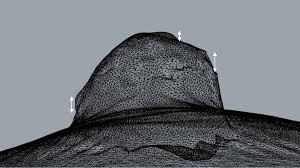FRIDAY, 26 OCTOBER 2007
The winning group of researchers, known collectively as the ‘Cambridge Breast IMRT Trial Management’ group, specialise in the development of IMRT (Intensity Modulated Radiotherapy) at the Addenbrooke's Hospital. A laser-scanned image of a breast. Image from Department of Engineering.
A laser-scanned image of a breast. Image from Department of Engineering.Major breakthroughs leading to the award was due to the collaboration with the University of Cambridge Department of Engineering. Dr Graham Treece’s group discovered a unique imaging tool to quantify the reduction of breast size using laser surface matching software.
For the first time in breast cancer, comparative analysis will be able to be carried out by imaging the surface of the skin to identify the ability of treatments to reduce breast tumours. This allows the proposed IMRT method to be tested for effectiveness against the current radiotherapy method.
Up until now, determination of changing shape and size has been difficult due to the complex curvature of the breast and the inability to match curvature from one visit to the next. The new imaging however, shows clearly the reduction.
Addenbrookes Hospital
Cambridge University Engineering Department
Written by Amy Chesterton
